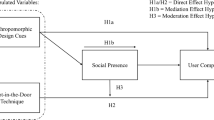Abstract
The research results on group consensus have been ambiguous within the field of Group Support Systems (GSSs). Some research studies have shown that groups using multiple communication channels produce more ideas, and more unique ideas than groups using a single communication channel. In addition, a second set of research findings have shown that groups using GSSs report group members hold “less consensus” with the group's decision. This research studies more closely how these two characteristics; communication channel and consensus, interact. Specifically, can “less consensus” be a function of the choice of channels used in problem solving. The results show that groups using a single communication channel generate more actual consensus than groups using multiple communication channels. Furthermore, the single channel discussions provide more integrative comments and these integrative comments may help explain the difference in consensus. These results suggest that those striving for consensus from group members should consider production methods used to create the information that is to be used in the decision.
Similar content being viewed by others
References
Benbasat, I. and L. Lim. (1993). "The Effects of Group, Task, Context, and Technology Variables on the Usefulness of Group Support Systems," Small Group Research 24 (4) (November), 430–462.
Bradford, Leland P. (1976). Making Meetings Work. University Associates.
Briggs, R. O., J. F. Nunamaker, and R. Sprague. (1998). "1001 Unanswered Research Questions in GSS," Journal of Management Information Systems 14 (3), 3–22.
Churchman, C. W. (1979). The Systems Approach. Laurel.
Cowan, D. A. (1986). "Developing a Process Model of Problem Recognition," Academy of Management Review 11 (4), 763–776.
DeBono, E. (1985). DeBono's Thinking Course. Facts on File Publications.
Dennis, A. R., B. Wixom, and R. J. Vandenberg. (2001). "Understanding Fit and Appropriation Effects in Group Support Systems Via Meta-Analysis," MIS Quarterly 25 (2), 167–197.
Dennis, A. R., J. S. Valacich, T. Cater, M. Garfield, B. Haley, and J. Aronson. (1997). "Research Report: The Effectiveness of Multiple Dialogues in Electronic Brainstorming," Information Systems Research 8 (2), 203–211.
Dennis, A. R. and J. S. Valacich. (1999). "Research Report: Electronic Brainstorming: Illusions and Patterns of Productivity," Information Systems Research 10 (4) (December).
Dennis, A. R. and J. S. Valacich. (1994). "Group, Sub-Group, and Nominal Group idea Generation: New Rules for a New Media?," Journal of Management 20(4), 723–736.
Dennis, A. R. and J. S. Valacich. (1993). "Computer Brainstorms: More Heads are Better Than One," Journal of Applied Psychology 78(4), 531–537.
Fox, W. M. (1987). Effective Group Problem Solving. Jossey-Bass.
Fjermestad, J. and S. R. Hiltz. (1999). "An Assessment of Group Support Systems Experimental Research: Methodology and Results," Journal of Management Information Systems 15 (3) (Winter), 7–150.
Gallupe, R. B., A. R. Dennis, W. H. Cooper, J. S. Valacich, L. M. Bastianutti, and J. F. Nunamaker Jr. (1992). "Electronic Brainstorming and Group Size," Academy of Management Journal 33 (2), 350–369.
Hiam, A. (1990). The Vest-Pocket CEO. Prentice-Hall.
Lim, L. and I. Benbasat. (1993). "A Theoretical Perspective of Negotiation Support Systems," Journal of Management Information System 9( 3), 27–44.
Markus, M. L. and D. Robey. (1988). "Information Technology and Organizational Change: Causal Structure in Theory and Research," Management Science 34, 583–598.
Martz, B. and M. Shepherd. (2002). "Using the Influence Level of Information to Explain the Non-consensus Process Loss," Group Decision and Negotiation 11 (4), 281–291.
Mason, R. O. and I. I. Mitroff. (1981). Challenging Strategic Planning Assumptions. John Wiley & Sons.
Ngwenyama, O. and A. Lee. (1997). "Communication Richness in Electronic Mail: Critical Social Theory and the Contextuality of Meaning," MIS Quarterly 21 (2), 145–167.
Nunamaker, J. F. Jr., D. R. Vogel, A. Heminger, W. B. Martz Jr., R. Grohowski, and C. McGoff. (1989). "Experiences at IBM with Group Support Systems: A Field Study," Decision Support Systems 5 (2) (June), 183–193.
Osborn, A. F. (1963). Applied Imagination. Scribners.
Pinsonneault, A., H. Barki, R. B. Gallupe, and N. Hoppen. (1999). "Research Note. The Illusion of Electronic Brainstorming Productivity: Theoretical and Empirical Issues," Information Systems Research 10 (4) (December), 110–133.
Polya, G. (1957). How to Solve It, 2nd Ed., Princeton University Press.
Siegel, S. (1956). Non-parametric Statistics. McGraw-Hill.
Shepherd, M. M., R. O. Briggs, B. A. Reinig, J. Yen, and J. F. Nunamaker Jr. (1996). "Social Comparison to Improve Electronic Brainstorming," Journal of Management Information Systems 12 (3) (Winter), 155–170.
Sniezek, J. A. and R. A. Henry. (1990). "Revision, Weighting and Commitment in Consensus Group Judgment," Organizational Behavior and Human Decision Processes 45, 66–84.
Valacich, J. S., A. R. Dennis, and T. Connolly. (1994). "Idea Generation in Computer-based Groups: A New Ending to an Old Story," Organizational Behavior and Human Decision Processes 57, 448–467.
Van de Ven, A. H. and A. L. Delbecq. (1974). "The Effectiveness of Nominal, Delphi and Interacting Group Decision Making Processes," Academy of Management Journal 17 (4), 606.
Warfield, J. N. (1989). Societal Systems. Intersystems Publications.
Whiting, C. S. (1958). Creative Thinking. Reinhold Publishing.
Zigurs, I. and B. K. Buckland. (1998). "A Theory of Task/Technology Fit and Group Support Systems Effectiveness," MIS Quarterly 22 (3), 313.
Author information
Authors and Affiliations
Rights and permissions
About this article
Cite this article
Martz, W.B., Shepherd, M.M. Group Consensus: The Impact of Multiple Dialogues. Group Decision and Negotiation 13, 315–325 (2004). https://doi.org/10.1023/B:GRUP.0000042859.55760.2f
Issue Date:
DOI: https://doi.org/10.1023/B:GRUP.0000042859.55760.2f




